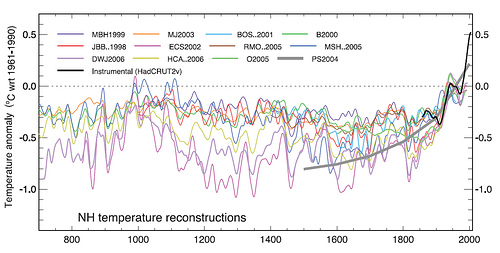You Know That Thing About Stones And Glass Houses?
In 2005, Congressman Joe Barton (BP hugger) commissioned a Congressional report from Edward Wegman that alleged climate scientists used sloppy statistics to produce the “hockey stick” graph. It turns out that Wegman plagiarized much of the report.
But in March, climate scientist Raymond Bradley of the University of Massachusetts asked GMU, based in Fairfax, Va., to investigate “clear plagiarism” of one of his textbooks.
Bradley says he learned of the copying from a year-long analysis of the Wegman report made by retired computer scientist John Mashey of Portola Valley, Calif. Mashey’s analysis concludes that 35 of the report’s 91 pages “are mostly plagiarized text, but often injected with errors, bias and changes of meaning.” Copying others’ text or ideas without crediting them violates universities’ standards, according to Liz Wager of the London-based Committee on Publication Ethics.
Allegations under review
“The matter is under investigation,” says GMU spokesman Dan Walsch by e-mail. In a phone interview, Wegman said he could not comment at the university’s request. In an earlier e-mail Wegman sent to Joseph Kunc of the University of Southern California, however, he called the plagiarism charges “wild conclusions that have nothing to do with reality.”
The plagiarism experts queried by USA TODAY disagree after viewing the Wegman report:
• “Actually fairly shocking,” says Cornell physicist Paul Ginsparg by e-mail. “My own preliminary appraisal would be ‘guilty as charged.’ ”
•”If I was a peer reviewer of this report and I was to observe the paragraphs they have taken, then I would be obligated to report them,” says Garner of Virginia Tech, who heads a copying detection effort. “There are a lot of things in the report that rise to the level of inappropriate.”
•”The plagiarism is fairly obvious when you compare things side-by-side,” says Ohio State’s Robert Coleman, who chairs OSU’s misconduct committee.
Bradley was one of the scientists who was the focus of the first report. BTW, here’s the hockey stick graph that has since been confirmed by many different sources.
Wegman’s response was pretty odd as well:
The Wegman report called for improved “sharing of research materials, data and results” from scientists. But in response to a request for materials related to the report, GMU said it “does not have access to the information.” Separately in that response, Wegman said his “email was downloaded to my notebook computer and was erased from the GMU mail server,” and he would not disclose any report communications or materials because the “work was done offsite,” aside from one meeting with Spencer.
Apparently Wegman’s work was done in a secret location – no doubt on a big pile of oil money. Wouldn’t you love to see the emails going back and forth from Wegman in the 2005/2006 timeframe? After all, the climate deniers have told us emails are important, no matter how out-of-context.
Tags: AGW, Climate, Climate Denial



So, let me get this straight. A report detailing flaws and possible purposeful falsification of climate data is not to be taken seriously because the report plagiarizes other reports?????
Isn’t the real problem that a group of scientists were apparently falsifying data? Let’s stick to the big picture shall we?
Isn’t the real problem that a group of scientists were apparently falsifying data? Let’s stick to the big picture shall we?
Actually, no. The real problem is that a group of scientists were accused of falsifying data by a bunch of people with no science background, but an ax to grind. But let’s say the falsifying data charge is true — then that means your man Wegman here was plagarizing bad data in the first place. Which would still make Wegman’s report fit for toilet paper.
Here’s the big picture, Pubius:
Mashey’s analysis concludes that 35 of the report’s 91 pages “are mostly plagiarized text, but often injected with errors, bias and changes of meaning.”
Errors, bias and changes of meaning. Got it yet?
The only way they can find to criticize real scientific data is to make stuff up. Which is what the GOP did and called it a Congressional report. The report writer knew what the conclusion of the report needed to be. That’s why he didn’t even bother to do research. I just wonder how Wegman was paid, and by who.
The plagiarism is only the start of the problems, and discussion of it accounts for maybe 10% of Executive Summary of the report, Strange Scholarship in the Wegman Report.
The scholarship was bad, the plagiarism was bad, some pieces likely rise to falsification:
Google FFP falsification
To see the big-3 of academic misconduct.
The Wegman Report frequently misstates science, contradicts sophomore physics, introduces laughable errors, references a 1987 ozone article in a fringe technology magazine by a tabloid writer and radio talk show guy later famed for black helicopters .
The minimal statistical analysis was simply rerunning McIntyre’s code.
It’s statistical models were wrong, then they used an awesome cherry pick to select examples from the 1% of data most favorable to their views. (see current discussion on replication at Deep Climate).
Almost nothing is right, which is how my report got to 250 pages.:-)
But the plagiarism is the easiest to understand.
Read the first few pages of SSWR itself, not short posts.